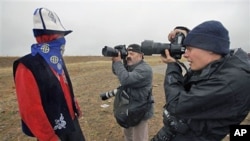In Kyrgyzstan, people vote Sunday in the kind of election that is rare in the post-Soviet space. No one knows who is going to win.
With rock concerts in the rain and loudspeaker vans roaming the streets, Kyrgyzstan's 29 parties wrapped up their campaigns Friday night for what is to be Central Asia's first parliamentary democracy. Edil Basailov, a candidate, said something else that is rare here.
"This is the first time in Kyrgyzstan or in entire Central Asian region that we don't know who is going to win," he said.
After the collapse of Soviet rule almost two decades ago, Central Asia's five republics all took the path of one-man rule, supported by what human rights groups call rigged elections.
Dmitry Medvedev, president of Russia, the former colonial power here, predicts that Kyrgyzstan's multiparty experiment will be a "catastrophe."
In Moscow, Mr. Medvedev posed recently for a portrait with Felix Kulov, leader of Ar-Namys, or Honor. This party promises to hold a referendum on returning Kyrgyzstan to the Presidential system. The Kremlin's photo endorsement graces a massive billboard on a main shopping avenue here.
US President Barack Obama took a different tack, meeting two weeks ago in New York with Rosa Otunbayeva, Kyrgyzstan's interim president. American aid has been spent on establishing a campaign code of ethics for the rival parties and to raise the transparency of voting and vote counting on election day.
Kyrgyzstan is the only nation in the world with both an American military base - and a Russian military base. Some political analysts say there are also pro-American parties and pro-Russian parties fighting over the nation's 2 million voters.
Shirin Aitmatova, a candidate of the Ata Meken, or Fatherland, party, sees the difference as generational. "These claims that one political party is pro-American and another political party is pro-Russian is actually not that true. Because right now there is an ideological strife between people who have more western values, and people who have old school Soviet values," she said.
This year, the United States is extending $211 million in aid to Kyrgyzstan, an amount only topped in the former Soviet Union by Georgia," said Meken. "American interest is high because the United States uses a section of Bishkek's international airport as the main transit center for NATO troops going in and out of Afghanistan, a two hour flight from here."
Last year, Kyrgyzstan's parliament voted to close the base. Washington only saved the base by quadrupling the annual rent. Since then, the government that signed the lease was overthrown in a street revolt. Then, in June, fighting killed hundreds of ethnic Kyrgyz and ethnic Uzbeks in southern Kyrgyzstan. In Osh, the epicenter of the ethnic violence, parties only distribute campaign materials in Kyrgyz, turning a cold shoulder to Uzbek voters.
Sergei Masaulov, a former advisor to the ousted president, warns that regionalism - Kyrgystan's deep north-south divide - will be the largest threat facing winning parties who try to form a coalition this fall.
With 29 parties competing Sunday, only five or six will win enough votes - about 8 percent of the total - to seat representatives in the new parliament. Given Kyrgyzstan's history of settling political disputes violently, many people fear that followers of the losing parties will take to the streets.
Pyotr Chyornyak, a former newspaper editor, warns of street unrest.
But Ms. Otunbayeva, Central Asia's first woman president, has learned lessons during her first six months in power. Friday night, police checkpoints were set up outside all major cities. Army and police units were patrolling extensively.
Edil Basailov, who served until June as Ms. Otunbayeva's chief of staff, says the campaigning phase of the election is ending with virtually no reports of violence. "It is time to celebrate the will of the people, it is time to celebrate democracy,'' Basailov said.
But Aitmatova, urged caution. "Kyrgyzstan is a country where you cannot predict anything. When I fall asleep, I do not know what country I will wake up in. It can be anything. Anything can happen here," she said.
With 435 international election observers now fanning out across this mountainous land, the whole world will be watching what happens Sunday in Kyrgyzstan.
Krygyzstan Votes for Parliamentary Democracy
- By James Brooke









